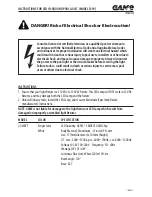
- 9 -
POWER THE PCS3
The final step in the installation is supplying power to the SolarAttic Pool Heater. The PCS3 is supplied
with a power cord that plugs into any standard 120 vac electrical outlet. In the simplest installation, an
outlet is wired to a manual switch and power is turned on as desired. The PCS3, however, is capable of
cooling as well as heating. Operating the system manually will not optimize the heat for the pool and its
resultant cooling for the home. If, for example, the manual system is turned on when the pool is
actually warmer than the attic, the attic will be warmed and the pool will be cooled. Therefore,
automation with the Goldline GL235 or other solar controller is highly recommended.
Following the use of a simple manual on/off switch is the use of an attic temperature switch wired in se-
ries with the PCS3 power and set to power the unit when the attic only reaches a set temperature. This
produces semi-automated operation. However, the heat extraction process will still not be optimized.
To optimize heat extraction requires full automation. This can be achieved with a variety of optional
solar control systems. Wiring diagrams for the Goldline GL235 solar control are illustrated in this man-
ual as an example. The Goldline GL235 is a simple solar control that does not require programming and
is the only solar control supported by SolarAttic’s technical staff.
Page 10 shows the “INTERNAL ELECTRICAL WIRING” diagram and it is presented here for refer-
ence purposes. Please note the location of the motor starting capacitor. If the motor fails to start, it
might be a thermal overload or the starting capacitor. However, failure of the capacitor is rare.
Page 11 shows the “AUTOMATION FLOAT WIRING DIAGRAM” and how to wire the optional in-
ternal float switch in SERIES with the attic (solar) 10K ohm temperature sensor. Note: Place the attic
sensor above the PCS3, out of the air flow and at the apex or peak of the attic. The discharge air of the
PCS3 can cool the temperature sensor down causing erratic cycling on & off of the unit. Therefore do
not locate the attic sensor where it can be influenced by the discharged cooler airflow of the PCS3.
Page 12-13 shows the “GOLDLINE GL235 CONTROL and INTERNAL CIRCUIT BOARD” and how
to connect the sensors and plugs inside the GL235 controller.
Important Notes
: It may be necessary to
remove the top circuit board of the GL235 in order to wire the temperature sensors or to access the
jumper options as shown on the upper right graphic of page 12. Page 13 shows the board installed.
Do
not wire 220vac power to the GL235 terminals used for 110vac. It will destroy the GL235.
Page 14 shows the “AUTOMATION WIRING DIAGRAM.” This diagram shows the full automation
wiring using the GL235 or a similar solar pool heater controller. Optional wiring diagrams are available
on SolarAttic’s web site and include: 1) How to use an auxiliary relay to slave the pump [or other equip-
ment] to the GL235 and ensure that water and air flow in the attic unit are syncronized; 2) How to use a
timer to enforce a minimal amount of filtration time during inclement weather when the sun does not
shine.
Important Note:
Heat transfer cannot occur unless both air flow and water flow are present at
the PCS3 at the same time. This is usually the problem when a system initially appears not to work. The
attic should feel “cooler” once the PCS3 has operated 20 minutes. If not, water and air are out of sync.
Note: The additional wiring diagrams and wiring options, including how to slave other equipment like
the pump to the GL235 control may be found at http://www.solarattic.com/wiring.html.
Page 15 shows the “GOLDLINE GL235 WIRING OPTION FOR 220VAC TIMERS.”
Use the above pages and the Automation instructions you received with your optional solar controller to
complete the wiring of the SolarAttic Pool Heater PCS3.
YOUR INSTALLATION SHOULD NOW BE COMPLETED.












































